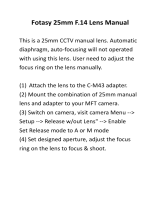10
I NSTRUCTIONS FOR
~_AR_R_I_FL_E_X_l_6_S
---I
BUCKLE SWITCH WITH MANUAL OVERRIDE
ME C H A N ISM (PLease refer to diagram on Page
9).
The buckle switch works properly only if the lower film loop is formed
exactly according to the marking in camera body. When end of film has
passed film gate, the Lower loop shortens, thereby pulling up the switch
r o lIe r H, which in turn cuts off the camera motor. Switching on the came-
ra again is only possible after the pressure roller assembly A has been
opened and closed as described in threading instructions. This manipula-
tion, which is always being performed when film is threaded into camera,
causes the buckle switch to reset itself. If the pressure roller assembly
A is not closed properly, the camera will not start. Any shortening of the
Lower loop ( e. g. film jam in camera) actuates the buckle switch.
IMPORTANT
Never actuate the switch roller H by h a n d
l
The buckle switch override mechanism permits to cut the buckle switch out
of the electrical circ uit of the camera at the option of the camera operator.
Experience has shown that on certain adverse and rare occasions, particu-
larly due to shock or vibration, the micro switch of the buckle switch be-
comes inoperative, thus switching the camera off. By means of the override
mechanism the cameraman in the field can quickly restart the camera with-
out removing the camera door.
In cas e of doubt whethe r the buckle switch was unintentionally triggered by
impacts or vibration, or whether it was actuated due to a film jam, it is re-
commended to open the camera cover to check film path and sacrifice a few
inches of film rather than use the external override control.
By pressing the push button D below the viewfinder, the buckle switch over-
ride mechanism is actuated and the break in the circuit due to the release
or the malfunction of the buckle switch is bridged, To reset the buckle
switch, the toggle lever U of the buckle switch override mechanism is turned
by hand to its initial position, interrupting its overriding function.
FILM GATE
The film gate is extra long ( 3 inches) and has an oversized rear pressure
pad and a side pres sure rail. It has cros s stages around the picture frame
both on front and back plates and "film breathing" is therefore impossible.
Made of stainless steel, lapped to high precision and wear chrome-pLated,
the Arriflex film gate also prevents film scratching.
























